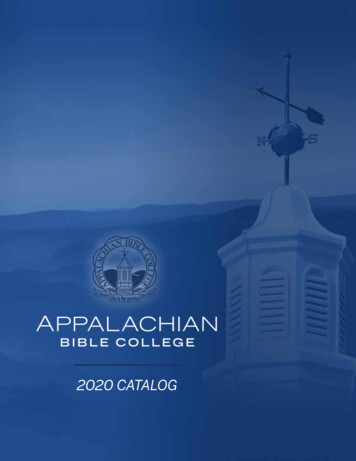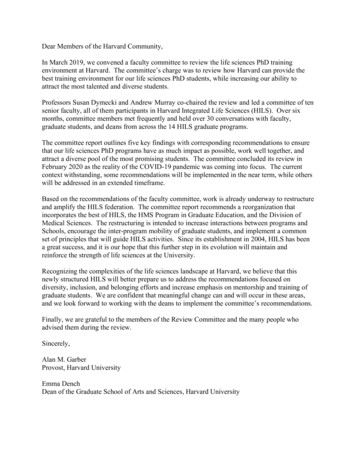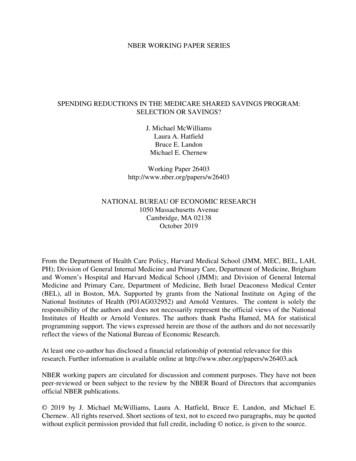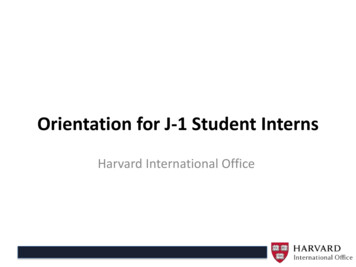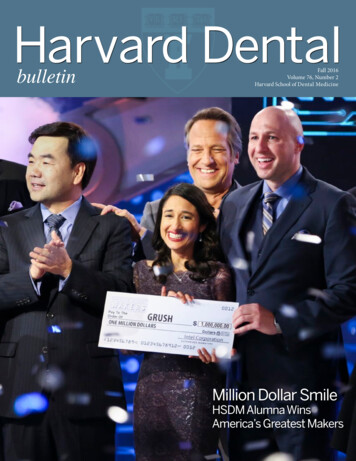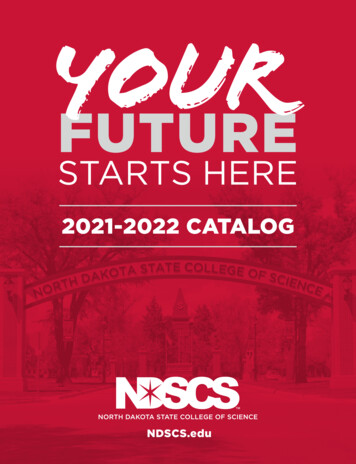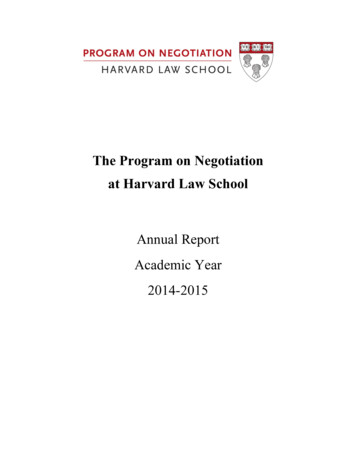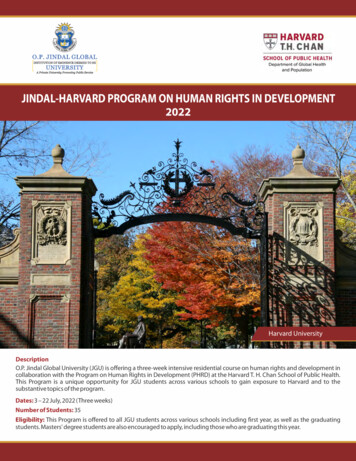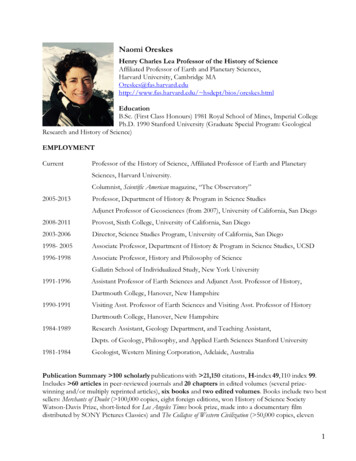
Transcription
Naomi OreskesHenry Charles Lea Professor of the History of ScienceAffiliated Professor of Earth and Planetary Sciences,Harvard University, Cambridge u/ hsdept/bios/oreskes.htmlEducationB.Sc. (First Class Honours) 1981 Royal School of Mines, Imperial CollegePh.D. 1990 Stanford University (Graduate Special Program: GeologicalResearch and History of Science)EMPLOYMENTCurrentProfessor of the History of Science, Affiliated Professor of Earth and PlanetarySciences, Harvard University.Columnist, Scientific American magazine, “The Observatory”2005-2013Professor, Department of History & Program in Science StudiesAdjunct Professor of Geosciences (from 2007), University of California, San Diego2008-2011Provost, Sixth College, University of California, San Diego2003-2006Director, Science Studies Program, University of California, San Diego1998- 2005Associate Professor, Department of History & Program in Science Studies, UCSD1996-1998Associate Professor, History and Philosophy of ScienceGallatin School of Individualized Study, New York University1991-1996Assistant Professor of Earth Sciences and Adjunct Asst. Professor of History,Dartmouth College, Hanover, New Hampshire1990-1991Visiting Asst. Professor of Earth Sciences and Visiting Asst. Professor of HistoryDartmouth College, Hanover, New Hampshire1984-1989Research Assistant, Geology Department, and Teaching Assistant,Depts. of Geology, Philosophy, and Applied Earth Sciences Stanford University1981-1984Geologist, Western Mining Corporation, Adelaide, AustraliaPublication Summary 100 scholarly publications with 21,150 citations, H-index 49, I10 index 99.Includes 60 articles in peer-reviewed journals and 20 chapters in edited volumes (several prizewinning and/or multiply reprinted articles), six books and two edited volumes. Books include two bestsellers: Merchants of Doubt ( 100,000 copies, eight foreign editions, won History of Science SocietyWatson-Davis Prize, short-listed for Los Angeles Times book prize, made into a documentary filmdistributed by SONY Pictures Classics) and The Collapse of Western Civilization ( 50,000 copies, eleven1
foreign editions). In addition: 60 opinion pieces in leading newspapers and magazines, and otherpopular writings, and since 2020 a monthly column in Scientific American. TED talk with 1,300,000views: https://www.ted.com/talks/naomi oreskes why we should believe in scienceHONORARY DEGREESETH Zurich, Honorary Doctor of Philosophy, 2018.University of British Columbia, Juris Legum (LL.D), 2018Roskilde University, Denmark, Doctor of Philosophy, 2016Colgate University, Honorary Doctor of Science, 2015Harvard University, Honorary Master of Arts, 2014VISITING PROFESSORSHIPS2012-2013 Professor-at-Large, Institute of Advanced Studies, University of Western Australia.2010 Francis Bacon Visiting Professor of History, California Institute of Technology2001 Visiting Associate Professor, Department of History of Science, Harvard UniversityMAJOR HONORSPhi Beta Kappa Visiting Scholar, 2020The British Academy Medal, 2019American Philosophical Society, elected 2018Guggenheim Fellow, 2018-2019American Academy of Arts and Sciences, Elected, 2017American Association for the Advancement of Science, Annual Meeting Plenary Speaker, 2017Stephen H. Schneider Award for Outstanding Climate Science Communication, 2016American Geophysical Union Ambassador and Fellow, 2016Frederick Anderson Climate Change Award, Center for International Environmental Law, 2016Convocation Speaker, The Evergreen State University, Olympia and Tacoma, Washington, 2016.Geological Society of America Public Service Award, 2015William T. Patten Visiting Lectureship, Indiana University, March 2015American Historical Association Herbert Feis Prize for Public History, 2014History of Science Society, Forum for American Science Distinguished Lecture, 2014American Geophysical Union Presidential Citation for Science and Society, 2014Commencement Speaker, University of California, Riverside, 2012Climate Change Communicator of the Year, George Mason University Center for Climate ChangeCommunication, 2011Francis Bacon Medal for outstanding scholarship in the history of science and technology, FrancisBacon Foundation and Caltech, 2009UCSD Chancellors Associates’ Faculty Excellence Award for Community Service, 20082
National Science Foundation Young Investigator, 1994-1999Society of Economic Geologists, Lindgren Prize (outstanding work by a young scientist) 1993SCHOLARLY PRODUCTS: DOCUMENTARY FILMMerchants of Doubt, 2015. A film by Robert Kenner, produced by Participant Media and distributed bySONY Pictures Classics. I appear in the film, consulted on all aspects of its production, and served asa liaison between the film-maker and many of the people featured in the film.Appearances at Screenings: Toronto Film Festival; NY Film Festival; Landmark Cinema,Cambridge, MA; Wheeler Opera House Aspen, CO; U.S. Congress, House Energy and EnvironmentCaucus, Washington, DC; Bristol (UK) Festival of Ideas; and many community groups and NGOs.SCHOLARLY PRODUCTS: BOOKSOreskes, Naomi and Erik M. Conway, in progress. The “Magic of the Marketplace”: The Construction of anAmerican Myth. New York: Bloomsbury Press, expected December 2020.Oreskes, Naomi, 2020. Science on a Mission: How Military Funding Shaped What We Do and Don’t Know aboutthe Ocean. Chicago: The University of Chicago Press, expected release December 2020.Oreskes, Naomi and Erik M. Conway, 2020. Merchants of Doubt: How a Handful of Scientists Obscured theTruth on Issues from Tobacco Smoke to Global Warming. New York: Bloomsbury Press, 2nd edition, with anew introduction by Al Gore and a new postscript by the authors.Oreskes, Naomi, 2019. Why Trust Science? Princeton University Press. Chinese edition to be published by Shanghai Scientific & Technological Education PublishingHouse, expected 2022. Swedish edition to be published by Stiftelsen Bokförlaget Thales, expected 2022.Michael Oppenheimer, N. Oreskes, D. Jamieson, K. Brysse, J. O’Reilly & M. Shindell, 2019. DiscerningExperts: The Practices of Scientific Assessment for Environmental Policy, Chicago: The University of ChicagoPress.Oreskes, Naomi and Erik M. Conway, 2014. The Collapse of Western Civilization, New York: ColumbiaUniversity Press. Oreskes, Naomi and Erik M. Conway, 2014. L’effrondrement de la Civilisation Occidentale, (Paris: LesLiens qui Liberent), 2nd edition with expanded Introduction by Naomi Oreskes 2015 German, Italian, Spanish, Complex Chinese, Japanese, Korean, Greek, Turkish, Czech andPolish editionsOreskes, Naomi and Erik M. Conway, 2010. Merchants of Doubt: How a Handful of Scientists Obscured theTruth on Issues from Tobacco Smoke to Global Warming. New York: Bloomsbury Press. Short-listed for the 2010 Los Angeles Times Book Prize. Winner of Watson-Davis Prize, History of Science Society, 2011.3
Japanese, Korean, French, Spanish, Italian, Simple Chinese, Complex Chinese, German andTurkish editions.Oreskes, Naomi, 1999. The Rejection of Continental Drift: Theory and Method in American Earth Science. NewYork: Oxford University Press.SCHOLARLY PRODUCTS: EDITED BOOKSOreskes, Naomi and John Krige, editors, 2014. Science and Technology in the Global Cold War, MIT Press.Oreskes, Naomi, editor, with Homer E. Le Grand, 2001. Plate Tectonics: An Insider’s History of the ModernTheory of the Earth (Boulder: Westview Press), paperback edition February 2003. Library Journal choice for one of the “Best Science and Technology Books of 2002,” Choice Magazine Outstanding Academic Title, 2003 Adopted as a core text by ERESE: Enduring Resources for Earth Science Education(http://earthref.org/ERESE).SCHOLARLY PRODUCTS: BOOK INTRODUCTIONSPope Francis, with Introduction by Naomi Oreskes. 2015. Encyclical on Climate Change and Inequality: OnCare for our Common Home. Melville Press.Haydn Washington and John Cook, with forward by Naomi Oreskes, 2011. Climate Change Denial: Headsin the Sand, 2011. (London, Earthscan Press), pp. xi-xviii.SCHOLARLY PRODUCTS: CO-AUTHORED SCIENTIFIC ASSESSMENTS & REPORTSCook, J., Supran, G., Lewandowsky, S., Oreskes, N., and Maibach, E., (2019). How Americans WereMisled About Climate Change. ica-misled/Cherry, John et al. (16 authors), 2014. Harnessing Science and Technology to Understand the EnvironmentalImpacts of Shale Gas Extraction, Ottawa: Council of Canadian leases/shale%20gas/shalegas fullreporten.pdfWhipple, Chris et al. (fifteen authors), 2007. Models in Environmental Regulatory Decision Making(Washington DC: National Academy of Sciences- National Research Council, Board onEnvironmental Studies and Toxicology), 287 pp.http://books.nap.edu/catalog.php?record id 11972SCHOLARLY PRODUCTS: EDITED JOURNAL VOLUMESOreskes, Naomi and James R. Fleming, eds. 2000. “Perspectives on Geophysics,” Special Issue ofStudies in the History and Philosophy of Modern Physics, 31B, September 2000.4
SCHOLARLY PRODUCTS: JOURNAL ARTICLESOreskes, Naomi, Colleen Lanier-Christensen, Hannah Conway and Ashton MacFarlane, in preparation.“The origins of ‘Weather and Climate’ in the Clean Air Act: Historical evidence of what Congressknew about carbon dioxide and climate in the late 1960s.” Harvard Law Review, expected submission2020.Elisabeth A. Lloyd, Naomi Oreskes, Sonia I. Seneviratne, and Edward J. Larson, 2020.“The mismatchbetween scientific and legal standards of demonstration in climate science,” in prep.Winsberg, Eric, Elisabeth A. Lloyd, Naomi Oreskes, 2020. “Severe Weather Event Attribution: Whyvalues won’t go away,” Studies in the History and Philosophy of Science, accepted pending revision.Oreskes, Naomi, 2020. “What is the social responsibility of climate scientists?” Special issue on“Witnessing Professionals,” edited by Nancy Rosenblum, Daedalus 149 (4) (Fall 2020).Tyson, Charlie and Naomi Oreskes, 2020. “The American University, the Politics of Professors and theNarrative of ‘Liberal Bias,’” Social Epistemology Review and Reply Collective 9 (8): 1432. https://wp.me/p1Bfg0-5gq.Supran, Geoffrey and Naomi Oreskes, 2020. “Addendum: ‘ExxonMobil’s climate changecommunications (1977-2014)’” Environmental Research Letters, https://doi.org/10.1088/1748-9326/ab89d5Erickson, Peter, Harro van Asselt, Doug Koplow, Michael Lazarus, Peter Newell, Naomi Oreskes,Geoffrey Supran, 2020. “Why fossil fuel producer subsidies matter.” Nature 578, 20-xLewandowsky, Stephan, Toby D. Pilditch, Jens K. Madsen, Naomi Oreskes and James S. Risbey, 2019.“Seepage and influence: An evidence-resistant minority can affect scientific belief formation andpublic opinion,” Cognition, 188: 1.011Lewandowsky, Stephan, Kevin Cowtan, James S. Risbey, Michael E. Mann, Byron A. Steinman, NaomiOreskes and Stefan Rahmstorf, 2018. The ‘pause’ in global warming in historical context: (II)Comparing models to observations, 2018. Environmental Research Letters 13https://doi.org/10.1088/1748-9326/aaf372.James S. Risbey, Stephan Lewandowsky, Kevin Cowtan, Naomi Oreskes, Stefan Rahmstorf, AriJokimäki and Grant Foster, 2018. A fluctuation in surface temperature in historical context:Reassessment and retrospective on the evidence. Environmental Research Letters 13https://doi.org/10.1088/1748-9326/aaf3425
Lloyd, Elisabeth A. and Naomi Oreskes, 2018. “Climate Change Attribution: When is it Appropriate toAccept New Methods?” Earth’s Future, 311-325.Oreskes, Naomi, 2017. Response by Oreskes to “Beyond Counting Climate Consensus,” EnvironmentalCommunication 11(6): 0/17524032.2017.1377094Zalasiewicz, J., et al., 2017. (21st of 26 authors). The Working Group on the Anthropocene: Summary ofEvidence and Interim Recommendations, Anthropocene 19: 55–60.Mann, Michael E, Elisabeth A. Lloyd and Naomi Oreskes, 2017. Assessing Climate Change Impactson Extreme Weather Events: An Alternative (Bayesian) Approach, Climatic Change.DOI: 10.1007/s10584-017-2048-3Supran, Geoffrey and Naomi Oreskes, 2017. “Assessing ExxonMobil’s climate change communications(1977-2014),” Environmental Research Letters 12 48-9326/aa815f[This was the 7th most discussed climate paper of 2017, according to McSweeney 2017’s top 10climate papers Carbon Brief papers-most-featuredin-the-media-in-2017) One media analysis suggests the paper or discussions of it reached over 500million readers. ]Oreskes, Naomi, 2017. “Systematicity is Necessary but Not Sufficient: On the Problem of FacsimileScience,” Synthèse 17-1481-1Baker, Erik and Naomi Oreskes, 2017. “Science as Game, Marketplace, or Both: A Reply to SteveFuller.” Social Epistemology Review and Reply Collective 6 (9): ve-fuller-erik-baker-and-naomi-oreskes/Baker, Erik and Naomi Oreskes, 2017. “It’s No Game: Post-Truth and the Obligations of ScienceStudies.” Social Epistemology Review and Reply Collective 6 (8): 1-10.http://wp.me/p1Bfg0-3FBSteffen, Will et al. (20th of 28 authors), 2016. “Stratigraphic and Earth System Approaches to Definingthe Anthropocene,” Earth’s Future 4(8): /2016EF000379/fullZalasiewicz, Jan et al., 2016 (18th of 25 authors). “Scale and diversity of the physical technosphere: Ageological perspective,” The Anthropocene Review: 053019616677743Oreskes, Naomi, 2016. “Let’s make history more welcoming,” ISIS 107: 10.1086/687214Cook, John, Naomi Oreskes et al. (14 authors), 2016. “Consensus on consensus: A synthesis ofconsensus estimates on human-caused global warming,” Environmental Research Letters 11: 48-9326/11/4/048002/meta6
Waters, Colin N. et al. (23rd of 24 authors), 2016. “The Anthropocene is functionally andstratigraphically distinct from the Holocene. Science 351 (6269): /aad2622Heede, Richard and Naomi Oreskes, 2016. Potential emissions of CO2 and methane from provenreserves of fossil fuels, Global Environmental Change 36: /pii/S0959378015300637Naomi Oreskes, Dale Jamieson and Michael Oppenheimer, 2015. “What Role for Scientists?” inSustainable Humanity, Sustainable Nature, Our Responsibility, edited by P.S. Dasgupta,V Ramanathan, andM Sanchez Sorondo, Pontifical Academy of Sciences and Pontifical Academy of Social Sciences,Proceedings of a Joint Workshop, pp 617-649.Oreskes, Naomi, 2015. The fact of uncertainty, the uncertainty of facts, and the cultural resonance ofdoubt. Phil. Trans. Royal Society A 373: DOI: dowsky, Stephan, James S. Risbey, and Naomi Oreskes, 2015. “On the definition andidentifability of the alleged “hiatus” in global warming,” Scientific Reports 5: 4657026/Lewandowsky, Stephan, James S. Risbey, and Naomi Oreskes, 2015. The “Pause" in Global Warming:Turning a Routine Fluctuation into a Problem for Science,” Bulletin of the American Meteorological 5/BAMS-D-14-00106.1Frumhoff, Peter, Richard Heede, and Naomi Oreskes, 2015. The climate responsibilities of industrialcarbon producers, Climatic Change 132: 157-171 -1472-5Dale Jamieson, Naomi Oreskes and Michael Oppenheimer, 2015. “Science and policy: Crossing theboundary,” Bulletin of the Atomic Scientists 70: 1. icy-crossing-boundary7900Oreskes, Naomi, Daniel Carlat, Michael Mann, Paul D. Thacker and Frederick S. vom Saal, 2015.“Viewpoint: Why disclosure matters,” Environmental Science and Technology 49 (13), pp. 26Lewandowsky, Stephan, Naomi Oreskes, James S. Risbey, Ben R. Nerwell and Michael Smithson, 2015“Climate Change Denial and its Effect on the Scientific Community,” Global Environmental Change 33:1-13. 0959378015000515Oreskes, Naomi, 2015. “How earth science became a social science,” Historical Social Research 40 (2):246-270.Zalasiewicz, Jan et al. (26th of 26 authors), 2014. “When did the Anthropocene begin? A mid-twentiethcentury boundary level is stratigraphically optimal,” Quaternary International 383: e/pii/S10406182140091367
Risbey, James S., Stephan Lewandowsky, Clothilde Langlais, Didier P. Monselesan, Terence J. O’Kane,and Naomi Oreskes, 2014. “Well-estimated global surface warming in climate projections selected forENSO phase,” Nature Climatic Change 4: doi:10.1038/nclimate2310i.Oreskes, Naomi, 2014. “Scaling Up Our Vision,” Isis 105: Oreskes, Naomi, 2013. “How Plate Tectonics Clicked,” Nature 501: 27-29.Oreskes, Naomi, 2013. “Why I Am a Presentist,” Science in Context, special issue on How and Why WeWrite History of Science, edited by Oren Harman and Alexandre Metraux, 26 : 595-609.Oreskes, Naomi, 2013. “The Scientist as Sentinel,” Limn 3: 69-71.Finley, Carmel and Naomi Oreskes, 2013. “Maximum Sustained Yield: A Policy Disguised as Science,”ICES Journal of Marine Science, 70: 70/2/245Oreskes, Naomi and Erik M. Conway, 2013. “The Collapse of Western Civilization: A View from theFuture,” Daedalus 142 (1) (Winter 2013): 40-58.Brysse, Keynyn, Naomi Oreskes, Jessica O’Reilly and Michael Oppenheimer, 2012. “’Climate ChangePrediction: Erring on the Side of Least Drama?” Global Environmental Change, 23: le/pii/S0959378012001215O’Reilly, Jessica, Michael Oppenheimer and Naomi Oreskes, 2012. “The Rapid Disintegration ofPredictions: Climate Science, Bureaucratic Institutions, and the West Antarctic Ice Sheet,” SocialStudies of Science, 42 (5): 6/26/0306312712448130.abstractO’Reilly, Jessica, Keynyn Brysse, Michael Oppenheimer and Naomi Oreskes, 2011. “Characterizinguncertainty in expert panel assessments,” Wiley Interdisciplinary Reviews: Climate Change 2 (September/October): 728-743.Erik Conway and Naomi Oreskes, 2011. "Communicating the Science of Climate Change," JudyLawrence, Alana Cornforth, Peter Barrett, eds., Climate Futures: Pathways for Society, New ZealandClimate Change Research Institute, December 2011.Oreskes, Naomi, 2011. “Metaphors of warfare and the lessons of history: Time to revisit a carbontax?” Climatic Change, 104: 223-230.Oreskes, Naomi, Leonard Smith and David Stainforth, 2010. “Adaptation to global warming: Doclimate models tell us what we need to know?” Philosophy of Science, 77 (December 2010): 1012-1028Oreskes, Naomi 2010. “Science, Technology, and Free Enterprise.” Centaurus 52: 297-310.Aronova, Elena, Karen Baker, and Naomi Oreskes, 2010. “From the International Geophysical yearthrough the International Biological Program to LTER: Big science and big data in biology, 1957present.” Historical Studies in the Natural Sciences, 40 (2): 183–224.8
Wang, Zuoyue and Naomi Oreskes, 2008. “History of Science and American Science Policy,” ISIS 99(2): 365-373.Oreskes, Naomi, Erik M. Conway, and Matthew Shindell, 2008. “From Chicken Little to Dr. Pangloss:William Nierenberg, Global Warming, and the Social Deconstruction of Scientific Knowledge,”Historical Studies in the Natural Sciences 38 (1): 109–152.Oreskes, Naomi, 2004. “The scientific consensus on climate change,” Science 306: 1686. Reprinted in Bill McKibben, 2012. The Global Warming Reader: A Century of Writing about Climate Change(New York: Penguin Books), pp. 75-80. Reprinted in Newsletter of Physicians for Social Responsibility, December 2004.Oreskes, Naomi, 2004. “Science and public policy: What’s proof got to do with it?” Environmental Scienceand Policy 7 (5): 369-383.Oreskes, Naomi, 2003. “A context of motivation: U.S. Navy oceanographic research and the discoveryof sea-floor hydrothermal vents,” Social Studies of Science 33 (5): 697-742.Oreskes, Naomi, 2001. “Getting oceanography done,” Earth Sciences History 19: 37-43.Oreskes, Naomi, 2000. “Laissez-tomber? Women’s work and military patronage in twentieth centuryoceanography,” Historical Studies in the Physical and Biological Sciences 30: 373-392.Oreskes, Naomi and James R. Fleming, 2000. “Why Geophysics?” Studies in the History and Philosophy ofModern Physics 31B: 253-257.Oreskes, Naomi and Ronald Rainger, 2000. “Science and security before the atomic bomb: The loyaltycase of Harald U. Sverdrup,” Studies in the History and Philosophy of Modern Physics 31B: 309-369.Rhodes, A.L., Naomi Oreskes, Naomi, and Sossity Sheets, 1999. “Geology and REE geochemistry ofthe magnetite deposits at El Laco, Chile.” Economic Geology Special Publication No. 7: Geology and OreDeposits of the Central Andes: 299-332.Rhodes, A.L., and Naomi Oreskes, 1999. “Oxygen isotope composition of magnetite deposits at ElLaco, Chile: Evidence of formation from isotopically heavy fluids,” Economic Geology Special PublicationNo. 7: Geology and Ore Deposits of the Central Andes: 333-351.Oreskes, Naomi, 1998. “Evaluation (not validation) of quantitative models,” Environmental HealthPerspectives 106 (supp. 6): 1453-1460.Murray, Jessica R. and Naomi Oreskes, 1997. “Use and limits of cathodoluminescence in the study ofapatite paragenesis.” Economic Geology 92: 368-376.Oreskes, Naomi, 1996. “Objectivity or heroism? On the invisibility of women in science,” OSIRIS 11:87-113. 2000 History of Science Society Women in Science Prize 1997 Forum for the History of Science in America Best Paper Prize9
Oreskes, Naomi, 1994. “Weighing the earth from a submarine: The S-21 expedition,” in The Earth, theHeavens, and the Carnegie Institution of Washington: Historical Perspectives after Ninety Years, Gregory Good,ed., American Geophysical Union History of Geophysics Series 5: 53-68.Oreskes, Naomi, Kristin Shrader-Frechette and Kenneth Belitz, 1994. “Verification, validation, andconfirmation of numerical models in the earth sciences,” Science 263: 641-646. Reprinted in Transactions of the Computer Measurement Group 84: 85-92, 1994. To be reprinted in “Climates and Cultures” edited by Mike Hulme, SAGE Library of theEnvironment, 2015.Rhodes, A.L., and Naomi Oreskes, 1994. The magnetite "lava flows (?)", El Laco, Chile: New evidencefor formation by vapor transport. 7 Congreso Geologico Chileno Actas Volumen II: 1501-1505;Universidad de Concepcion, Departamento de Ciencias de la Tierra.Oreskes, Naomi and M.W. Hitzman, 1993. “A model for the origin of 'Olympic Dam-type' deposits,” inMineral Deposit Modeling, Geological Association of Canada Special Paper 40: 615-633.Oreskes, Naomi and M.T. Einaudi, 1992. “Origin of hydrothermal fluids at Olympic Dam: Preliminaryresults from fluid inclusions and stable isotopes,” Economic Geology 87 (1): 64-90.Hitzman, M.W., Naomi Oreskes, Naomi, and M.T. Einaudi, 1992. “Geologic characteristics and tectonicsetting of Proterozoic Fe-REE deposits,” Precambrian Research 58: 241-287.Mango, Helen, Half Zantop, Half, and Naomi Oreskes, 1991. “A fluid inclusion and isotope study ofthe Rayas Ag-Au-Cu-Pb-Zn mine, Guanajuato, Mexico,” Economic Geology 86 (7): 1546-1553.Oreskes, Naomi and M.T. Einaudi, 1990. “Origin of LREE-enriched hematite breccias at the OlympicDam, Cu-U-Au-Ag deposit, Roxby Downs, South Australia,” Economic Geology 85 (1): 1-28.Einaudi, M.T., and Naomi Oreskes, 1990. “Progress towards an occurrence model for Proterozoic ironoxide (Cu, U, REE, Au) deposits—A comparison between the ore provinces of South Australia andSE Missouri,” invited contribution to Pratt, Walden P., and Sims, P.K., eds., The Midcontinent-Permissive Terrain for an Olympic Dam deposit? U.S.G.S. Bulletin No. 1932: 58-69.Oreskes, Naomi, 1988. “The rejection of continental drift,” Historical Studies in Physical Sciences 18 (2):311-348.SCHOLARLY PRODUCTS: CHAPTERS IN BOOKS/EDITED VOLUMESOreskes, Naomi, Erik M. Conway and Charlie Tyson, 2020. “How American Businessmen Made UsBelieve that Free Enterprise was Indivisible from American Democracy: The National Associationof Manufacturers’ Propaganda Campaign 1935 -1940, accepted for inclusion in The DisinformationAge: Communication, Technology, and Democracy in Transition, edited by Lance Bennett and StevenLivingston, Cambridge University Press.Grinevald, Jacques, John McNeill, Naomi Oreskes, Will Steffen, Colin Summerhayes, and JanZalasiewicz, 2019. History of the Anthropocene Concept, in “The Anthropocene as a10
Geological Time Unit” edited by Jan Zalasiewicz, Colin N. Waters, Mark Williams, and ColinSummerhayes, Cambridge University Press.Oreskes, Naomi, 2018. “The Scientific Consensus on Climate Change: How Do We Know We’re NotWrong?” (revised), in Climate Modelling: Philosophical and Conceptual Issues, edited by Elisabeth A. Lloydand Eric Winsberg, London: Palgrave MacMillan, pp. 31-64Oreskes, Naomi, Erik Conway, David J. Karoly, Joelle Gergis, Urs Neu, Christian Pfister, 2018. “TheDenial of Global Warming” in Palgrave Handbook of Climate History Sam White, Christian Pfister, andFranz Mauelshagen, eds. London: Palgrave Macmillan, 199Sheldon, Myrna Perez and Naomi Oreskes, 2017. “The Religious Politics of Doubt: EvangelicalChristians and the Politics of Environmentalism in the United States,” Wiley-Blackwell Companion toReligion and Ecology, John Hart, ed., pp. 348-367.Alisa Bokulich and Naomi Oreskes, 2017. “Models in the geosciences,” Handbook of Model-Based Science,ed. by L. Magnani and T. Bertolotti. Springer, Switzerland, pp. 897-917.Oreskes, Naomi, 2014. “Introduction,” Science and Technology in the Global Cold War ed. by Naomi Oreskesand john Krige, pp 1-10, MIT Press.Oreskes, Naomi, 2014. “Science in the origin of the Cold War,” Science and Technology in the Global ColdWar ed. by Naomi Oreskes and john Krige, pp 11-30, MIT Press.Oreskes, Naomi, 2014. “Changing the Mission: From the Cold War to Climate Change,” in Science andTechnology in the Global Cold War ed. by Naomi Oreskes and john Krige, pp 141-188, MIT Press.Oreskes, Naomi 2012. “Les Marchands de Doute,” in Controverses Climatiques: Sciences et Politique, Editedby Edwin Zaccai, Francois Gemmene, and Jean-Michel Decroly, Les Presses de Sciences Po, Paris.Oreskes, Naomi, 2011. “Seeing Climate Change,” in Survival Does Not Lie in the Heavens (An Exhibitionby Dario Robleto), edited by Gilbert Vicario, Des Moines Art Center.Oreskes, Naomi, 2011. “Working with Uncertainty: ‘Unitisation and Renegotiation’ as a Model forScience and Environmental Policy,” in The Politics of Science Advice: Institutional Design for QualityAssurance. Edited by Justus Lentsch and Peter Weingart, Cambridge University Press, pp. 36-53.Oreskes, Naomi, 2010. “My facts are better than your facts: Spreading good news about globalwarming.” in How Well Do Facts Travel? Edited by Mary S. Morgan and Peter Howlett, CambridgeUniversity Press, pp. 135-166.Oreskes, Naomi, and Erik Conway, 2008, “Challenging Knowledge: How Climate Science became aVictim of the Cold War,” Agnotology: The Making and Unmaking of Ignorance, edited by Robert N.Proctor and Londa Schiebinger, Stanford University Press, pp. 55-89.Oreskes, Naomi, 2007, “From scaling to simulation: Changing meanings and ambitions of models in theEarth sciences,” in Science without Laws: Model Systems, Cases, and Exemplary Narratives, edited by AngelaN.H. Creager, Elizabeth Lunbeck, and M. Norton Wise, Duke University Press, pp 93-124.11
Oreskes, Naomi, 2007, “The scientific consensus on climate change: How do we know we’re notwrong?” Climate Change: What It Means for Us, Our Children, and Our Grandchildren, edited by Joseph F.C. DiMento and Pamela Doughman, MIT Press, pp. 65-99.Munk, Walter, Naomi Oreskes, and Richard Muller, 2004. “Gordon J.F. MacDonald,” National Academyof Sciences Biographical Memoirs 84: 3-26.Oreskes, Naomi, 2003. “The role of quantitative models in science,” in Models in Ecosystem Science, editedby Charles D. Canham, Jonathan J. Cole, and William K. Lauenroth (Princeton: Princeton UniversityPress), pp. 13-31.Oreskes, Naomi and Ronald E. Doel, 2002. “Physics and chemistry of the earth,” in The CambridgeHistory of Science, Volume V: Modern Physical and Mathematical Sciences, edited by Mary Jo Nye,(Cambridge: Cambridge University Press), 538-552.Oreskes, Naomi, 2002. “Gravity surveys in the ‘permanent’ ocean basins: An instrumental chink in atheoretical suit of armor,” in Oceanographic History: The Pacific and Beyond, edited by Keith R. Bensonand Philip F. Rehbock (Seattle: University of Washington Press), pp. 502-510.Oreskes, Naomi and Kenneth Belitz, 2001. “Philosophical Issues in Model Assessment,” in ModelValidation: Perspectives in Hydrological Science, edited by M.G. Anderson and P.D. Bates (London: JohnWiley and Sons, Ltd.), pp. 23-41.Oreskes, Naomi, 2000. “Why believe a computer? Models, measures, and meaning in the natural world,”in The Earth Around Us: Maintaining a Livable Planet, edited by Jill S. Schneiderman (San Francisco:W.H. Freeman and Co.), pp. 70-82.Oreskes, Naomi, 2000. “Why predict? Historical perspectives on prediction in the earth sciences,” inPrediction: Science, Decision-making and the Future of Nature, edited by Daniel Sarewitz, Roger Pielke, Jr.,and Radford
University of British Columbia, Juris Legum (LL.D), 2018 Roskilde University, Denmark, Doctor of Philosophy, 2016 Colgate University, Honorary Doctor of Science, 2015 Harvard University, Honorary Master of Arts, 2014 VISITING PROFESSORSHIPS 2012-2013 Professor-at-Large, Institute of Advanced Studies, University of Western Australia.
